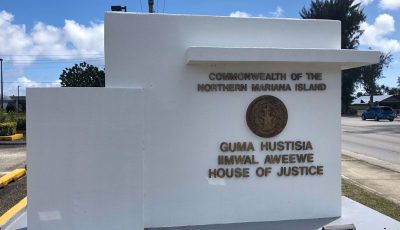Convicted burglar’s petition to compel clerk of court to comply with rules denied
The CNMI Supreme Court has denied a convicted burglar’s petition for a writ compelling the Superior Court’s Office of the Clerk of Court to comply with the high court’s rules regarding the assembly, certification, and transmittal of the record on appeal.
The high court justices said they recognize petitioner Sonny Babauta’s concerns, and they are not diminishing the importance of an appellant’s right to a full and complete record for a meaningful appellate review.
However, the justices said, mandamus is a drastic remedy and must be used only in extraordinary situations.
“Especially where an ordinary procedure is available, as here, writ of mandamus is not the proper vehicle to seek redress,” said the high court’s decision signed on Wednesday by Chief Justice Alexandro C. Castro, Associate Justice Perry B. Inos, and Justice Pro Tem Robert J. Torres Jr.
Babauta was among five persons charged for his role in the conspiracy to burglarize a warehouse in Afetnas and steal copper wire and other items. He went to trial and was convicted by the jury. He appealed his conviction. The appeal is still pending in the Supreme Court.
On Feb. 25, 2014, Babauta filed a notice of appeal.
On Jan. 26, 2016, the Superior Court’s Office of the Clerk filed the certificate of record, attesting the documents comprising the record on appeal, including pleadings, exhibits, and the transcript of proceedings, were available to the parties at the Superior Court’s Clerk’s Office.
In another case pending before the CNMI Supreme Court, Monkeya’s counsel filed a petition for writ of mandamus, impelling the Clerk to comply with the rules for the proper assembly, certification, and transmission of the appellate record.
Subsequently, Babauta filed a motion to stay the briefing schedule pending the outcome of the Monkeya petition, asserting the resolution of those issues was pertinent to his appeal. The Supreme Court denied the motion based on procedural deficiencies.
On March 22, 2016, Babauta filed a motion to stay the appeal proceedings and concurrently filed a motion for a writ of mandamus.
Babauta, through counsel Jennifer Dockter, argues the clerk failed to comply with the Supreme Court rules pertaining to the assembly, certification, and transmittal of the appellate record.
He asserts the record is unreliable because it is incomplete and is not properly assembled.
Due to these alleged deficiencies, Babauta claims he cannot proceed with his appeal brief, and thus, the Supreme Court must compel the clerk to comply.
In denying Babauta’s petition, the justices said issuance of a writ of mandamus is a drastic remedy invoked only in the “most dire of instances when no other relief is available.”
The justices said Babauta’s argument fails because NMI Supreme Court Rule 10(e) provides recourse to cure deficiencies in the record.
Under Rule 10(e), parties can correct any material differences, omissions, or inaccuracies in the record by submitting the error to the clerk or through stipulation.
The justices said Babauta failed to show that he made any efforts to identify or reconcile the errors with the clerk or the Commonwealth.
The justices said the alleged injury is unsubstantiated and at best, speculative.
“There is no showing how the deficient record prevents him from going forward with the appeal,” the justices said.
The justices said although the trial exhibits were not assembled with the record, they cannot conclude that such exclusion by the clerk was clearly erroneous.
The justices said a single instance of an alleged error does not establish an oft-repeated error.
Therefore, the justices said they cannot conclude that the clerk persistently disregarded the rules.
Last March, Superior Court Associate Judge Joseph N. Camacho resentenced Babauta’s co-defendant Jeffrey Jindawong Lizama to the maximum of five years imprisonment.
Babauta was among the five defendants charged in the burglary at the warehouse of Han Nam, formerly known as the Onu Moda Factory, on Dec. 18 and 19, 2012.
Lizama and Mathias Salasiban pleaded guilty to burglary. In 2013, Camacho slapped the two with a maximum sentence of 10 years in prison with no parole.
Lizama and Salasiban appealed.
In 2014, the CNMI Supreme Court returned the case to Superior Court for resentencing because not ordering the presentence investigation report resulted in Salasiban receiving a sentence twice as long as the statutory maximum for the crime he committed.
In June 2015, Camacho resentenced Salasiban to the maximum of five years in prison.
The two other co-defendants are Fiden Hamo and Petrus Anastacio.
Hamo pleaded guilty in the burglary case and also in a rock-throwing incident. He was slapped with a five-year jail term.
Anastacio’s charge of accessory after the fact to burglary was dismissed during the trial.



























